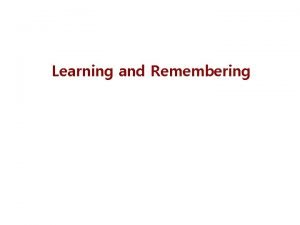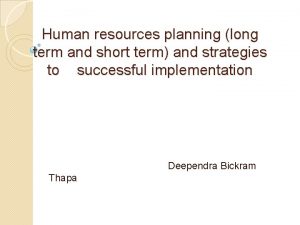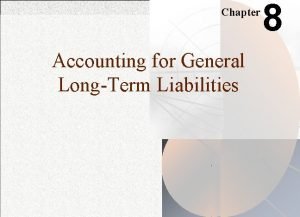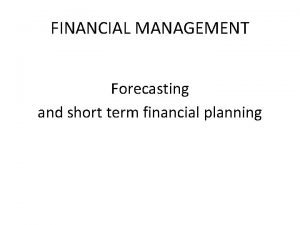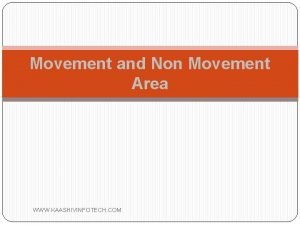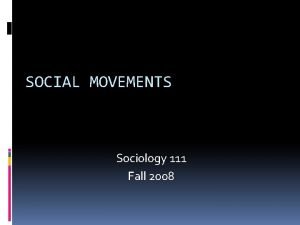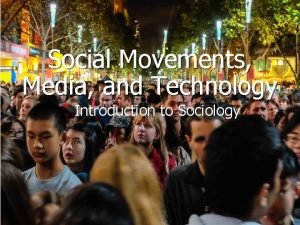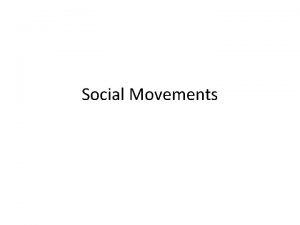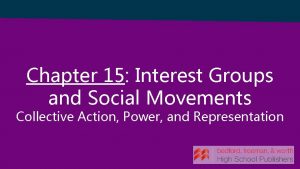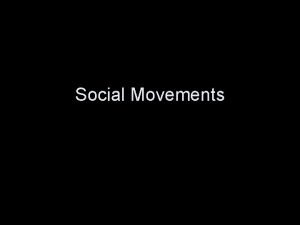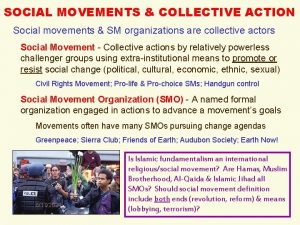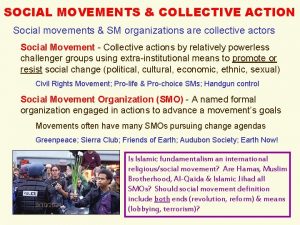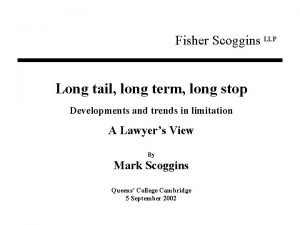Social Movements Social Movement a long term conscious
















- Slides: 16

Social Movements

Social Movement: a long term conscious effort to promote or prevent social change. Social movement may develop around any issue of public concern If you were going to start a social movement, what would it be? What is the social movement? What is its purpose? Why should people join this social movement?

Types of Social Movements Social Change - alterations in various aspects of society over time Social Movements – long-term conscious effort to promote or prevent social change

Reactionary Movements Reverse current social trends Members are suspicious or hostile toward social change Want to return society to way they believe it existed in the past Ex: Ku Klux Klan, Protestant Reformation, Chinese Communist Revolution

Conservative Movements Try to protect what they see as society’s prevailing values Consider change a threat to those values Ex. The Religious Right’s view of “family values”

Revisionary Movements Use legal channels to seek change Support the existing social system as a whole Usually focuses on a single issue Use political campaigns, lobbyists, and the courts Ex. Women’s Suffrage, Civil Rights Movement

Revolutionary Movements Total and radical change of the existing social structure Ultimate aim is to overthrow existing government and replace it Involve violent or illegal actions and can result in drastic and widespread social change Arises when people see no chance for reform Ex. American Revolution, Bolshevik Revolution, Fidel Castro’s Revolution

Life Cycles of Social Movements

Agitation Belief that a problem exists and that solutions need to be found Small group of people with strong commitment attempt to stir up awareness Potential social movements usually die out at this stage

Legitimation Movement becomes more respectable and gains acceptance Leaders (previously dismissed) as accepted as spokespeople of a just cause Authorities begin to see concerns as legitimate Attracts media attention Commitment remains high, particularly among new members

Bureaucratization Organizational structure becomes more formal Movement develops ranked structure of authority, official policies, efficient strategies for the future Original goals are sometimes swept aside as more time and energy are needed to handle day-to-day operations

Institutionalization Has become an established part of society Bureaucrats replace idealists who helped found the movement Often care more about position than goals of the movement Movement frequently resists proposals for change Members drift away, feeling that movement has abandoned original cause Movement goes into decline

The Labor Movement

Relative Deprivation Theory Social movements arise when large numbers of people feel economically or socially deprived of what they think they deserve Not measured in absolutes, but by comparison to others or what people expect society to provide People join movements because they feel deprived relative to other people or groups with whom they identify People seek to gain access to things they lack but others have Higher incomes, better conditions, broader political rights Used to explain revolutionary movements

Resource Mobilization Theory Most sociologists believe that movements only occur if people are successful in organization and effective use of resources Not even the most ill-treated group with the most just cause can bring about change without resources A body of supporters Financial resources Access to the media

A body of supporters Talented people who have the time and skills to work toward change College students are most likely Leadership and organizational abilities Leaders must be charismatic and well spoken Financial Resources Money to print posters and leaflets Travel to demonstrations and rallies Rent meeting places and hire press agents and lawyers Encourage legal proceedings to enact social change Access to the Media Creates exposure and allows more people to become aware, educated, and open the movement
 Locomotor movements dance examples
Locomotor movements dance examples Long medium and short term planning in primary schools
Long medium and short term planning in primary schools Long term memory vs short term memory
Long term memory vs short term memory Short term hr planning
Short term hr planning Difference between long term and short term liabilities
Difference between long term and short term liabilities Long term liabilities
Long term liabilities Long-term goals examples
Long-term goals examples Short term finance planning
Short term finance planning Tall + short h
Tall + short h Once upon a time,there
Once upon a time,there Corporate social responsibility vs conscious marketing
Corporate social responsibility vs conscious marketing Movement and non movement area
Movement and non movement area Redemptive social movements
Redemptive social movements Media consolidation sociology definition
Media consolidation sociology definition Alternative social movement
Alternative social movement Characteristics of social movements
Characteristics of social movements Interest groups vs social movements
Interest groups vs social movements


